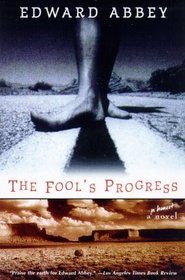Helpful Score: 1
To be honest, I was concerned while reading the opening scenes and almost put the book down: Henry Lightcap treats his current wife miserably. when she decides to leave him for a computer engineer, he is so distraught that he takes out a .22 and shoots the refrigerator (the culmination, as it turns out, of his hatred for technology and "modern civilization". Oh no, I thought, a self-absorbed misogynist tells his sufferings. For the most part, I was wrong (there is plenty of suffering). This was one of the best books I've read in a good long while.
The main character Henry, I learned later, is a close representation of the reclusive author. Abbey apparently reveals much of his own life through this "honest novel", but to what extent...I wish I knew. Henry grew up in the West Virginia backwoods, submerged in nature, and later rediscovered the even more intense wilderness of the West.
The flashback chapters to the past are interspersed with the Henry here-and-now, older, in his sixties, and harboring a grim secret. Like him, his truck is on it's last odometer rotations. The dog, Solstice, is also old and sickly, and is one of the few beings Henry is tender toward, and makes for some of the more touching scenes.
What initially perplexed and repelled me at first was Henry's treatment of women. Throughout his life he only falls for the bombshells who, ultimately, have nothing in common with him and his love of the wilderness. When he drags is first wife from NYC to barren New Mexico, things do not bode well. After so much trouble with women, evidence of Henry's first real love comes as a shock. Henry is more complex than he seemed, and I began to empathize with him.
This book seems outwardly like it would be a simple semi-memoir, but Abbey's descriptions, especially of nature and wild places, elevate it to something more. The tone is bleak, of a man looking back on his life and contemplating his regrets, but is not without humor (a certain Grand Canyon scene, for example, or his arrest in Denver). When I read Abbey, a (para)phrase from his Desert Solitaire comes to mind: get out of the car and walk, better yet crawl through the dirt and rocks and cactus. You can't get the full experience any way else--this philosophy sums up A Fools Progess well. Highly recommended.
The main character Henry, I learned later, is a close representation of the reclusive author. Abbey apparently reveals much of his own life through this "honest novel", but to what extent...I wish I knew. Henry grew up in the West Virginia backwoods, submerged in nature, and later rediscovered the even more intense wilderness of the West.
The flashback chapters to the past are interspersed with the Henry here-and-now, older, in his sixties, and harboring a grim secret. Like him, his truck is on it's last odometer rotations. The dog, Solstice, is also old and sickly, and is one of the few beings Henry is tender toward, and makes for some of the more touching scenes.
What initially perplexed and repelled me at first was Henry's treatment of women. Throughout his life he only falls for the bombshells who, ultimately, have nothing in common with him and his love of the wilderness. When he drags is first wife from NYC to barren New Mexico, things do not bode well. After so much trouble with women, evidence of Henry's first real love comes as a shock. Henry is more complex than he seemed, and I began to empathize with him.
This book seems outwardly like it would be a simple semi-memoir, but Abbey's descriptions, especially of nature and wild places, elevate it to something more. The tone is bleak, of a man looking back on his life and contemplating his regrets, but is not without humor (a certain Grand Canyon scene, for example, or his arrest in Denver). When I read Abbey, a (para)phrase from his Desert Solitaire comes to mind: get out of the car and walk, better yet crawl through the dirt and rocks and cactus. You can't get the full experience any way else--this philosophy sums up A Fools Progess well. Highly recommended.




![header=[] body=[Get a free book credit right now by joining the club and listing 5 books you have and are willing to share with other members!] Help icon](/images/question.gif?v=29befa08)
